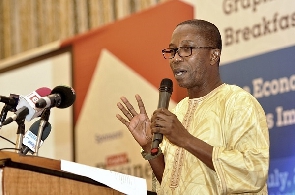Economist, Dr Yao Graham has blamed Ghana’s current economic challenges on policies implemented during the era of the the Jerry John Rawlings-led Provisional National Defence Council (PNDC) in the mid-80s through to the early 90s.
According to the Graham, who is Coordinator of the Third World Network Africa, the current state of Ghana’s economy is largely due to the failure of successive governments to depart from the economic blueprint set out by the then military government led by the late Jerry John Rawlings.
“Some of the elements of the debt crisis that we are dealing with, some of the elements of the economic policies are not simply attributable to the NPP. The NPP and the NDC have had a consensus about economic policies, the fight really has been about who will be in power and who will be sitting at the top and helping themselves and their associates.
“What we are experiencing today, the foundations were laid by the policy choices of the PNDC. The PNDC’s Jerry Rawlings was the benefactor of the Ghanaian elites, they hate him, but he is their godfather.
“He created this economy with the choices he made in the 80s. Some of us left the government because we saw the drift to the right, the choice of neo-liberalism and where it was likely to lead,” Dr Graham is quoted to have said in a report by Citinewsroom.com.
“By the end of the Rawlings period, if you look at the composition, it was no different from any of the preceding military governments. It is precisely because the elites felt comfortable with it,” he added.
With an economy under heavy stress from rising inflation, currency depreciation and ballooning national debt, the government of Ghana is looking at a US$3 billion International Monetary Fund loan for salvation.
The government in an effort to meet requirements to secure the IMF loan, introduced a debt restructuring programme.
The DDEP programme which aims to tackle government debt on the local front, sought to vary the terms of existing bonds.
The ministry at the commencement of the programme announced a target of 80% or more of bondholders.
The exercise, however, attracted resistance from several bondholders including some pensioners who took to picketing at the premises of the ministry demanding total exemption from the programme.
Meanwhile, the ministry of finance in a statement announcing the closure of the programme said that over 80% of elibible bondholders susbscribed to the DDEP.
Watch the latest episode of The Lowdown below:
You can also watch this episode of People & Places here:
GA/SARA
General News of Tuesday, 14 February 2023
Source: www.ghanaweb.com

















